 |
 |
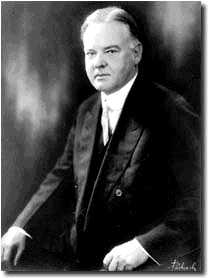 Historians
call “Black Tuesday”, October 29th, 1929, the start of the Great Depression
in the United States. It was on this day that people began to sell their
stocks at a pace that had never happened before. It wiped out all
of the gains that had taken place the year before. People felt that
the stock market was an indicator of the general well being of the economy
of the nation. November 30th, 1929 brought the lowest stock prices
in history, over 30 billion dollars disappeared from the economy.
President Herbert Hoover did not want to make matters worse, by calling
this a “panic” so was careful in choosing what word would be the right
one. He decided that he would say this is just a “depression” not
a “panic.” Historians
call “Black Tuesday”, October 29th, 1929, the start of the Great Depression
in the United States. It was on this day that people began to sell their
stocks at a pace that had never happened before. It wiped out all
of the gains that had taken place the year before. People felt that
the stock market was an indicator of the general well being of the economy
of the nation. November 30th, 1929 brought the lowest stock prices
in history, over 30 billion dollars disappeared from the economy.
President Herbert Hoover did not want to make matters worse, by calling
this a “panic” so was careful in choosing what word would be the right
one. He decided that he would say this is just a “depression” not
a “panic.”
In the year 1929 and continuing through the 1930’s over 14,000,000 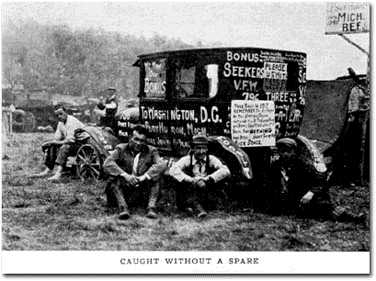 Americans were jobless. This is one of the results of the Great Depression.
A depression in the economy is an extended period of businesses being unable
to sell or buy materials. Production of supplies begin to drop, so
do the prices of goods, income of people, and their ability to find jobs.
Money becomes hard to come by. This occurs over and over as unemployment
raises and people can no longer buy the items they used to afford.
Americans were jobless. This is one of the results of the Great Depression.
A depression in the economy is an extended period of businesses being unable
to sell or buy materials. Production of supplies begin to drop, so
do the prices of goods, income of people, and their ability to find jobs.
Money becomes hard to come by. This occurs over and over as unemployment
raises and people can no longer buy the items they used to afford.
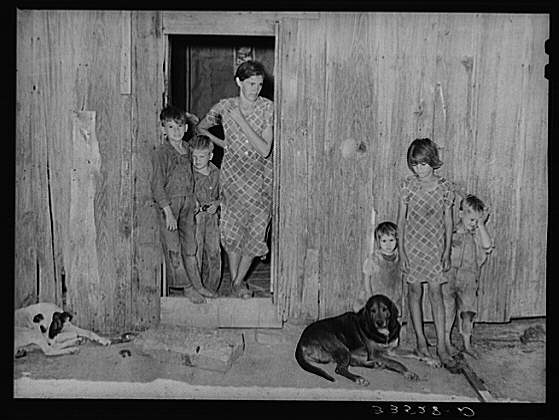 Over 5,000 banks failed. Many people lost their savings. Including all
of their money in their other bank accounts. There was about $75,000,000,000
was lost. Many people are unable to pay their rent or for their homes.
This causes them to lose their homes. People have to live on charity.
This tends to make them feel humiliated. People begin to lose faith
in themselves. Some ate from the garbage of people who still had money.
Some turned to crime to feed family. Every family had their own nightmares.
Sickness was common and many people died because there were almost no doctors.
The entire economy upset by the stock market crash. There were fewer people
to make investments. Factories and mines had to fire their workers. Some
factories closed down.
Over 5,000 banks failed. Many people lost their savings. Including all
of their money in their other bank accounts. There was about $75,000,000,000
was lost. Many people are unable to pay their rent or for their homes.
This causes them to lose their homes. People have to live on charity.
This tends to make them feel humiliated. People begin to lose faith
in themselves. Some ate from the garbage of people who still had money.
Some turned to crime to feed family. Every family had their own nightmares.
Sickness was common and many people died because there were almost no doctors.
The entire economy upset by the stock market crash. There were fewer people
to make investments. Factories and mines had to fire their workers. Some
factories closed down.
Bread sold for seven cents a loaf. Butter sold for forty-nine cents a pound 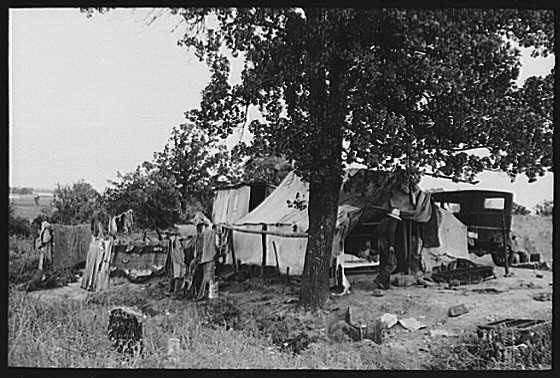 .
Still people bought less bread and butter. People no longer had money to
buy groceries. Cities set up a soup kitchens and breadlines. The soup and
bread they got was only a crust of bread and a little cup of thin, tasteless,
lukewarm soup. Many people sold apples for money. People in some cities
invaded food markets for food. Parents didn’t have money to buy their
children enough food or clothing. This forced some parents to turn
their children over to orphanages or State Schools. Families started to
break apart. Within six months (half a year) 4,000,000 people had lost
their jobs because of the stock market crash. President Hoover promised
that the hard times would be over soon. The joble .
Still people bought less bread and butter. People no longer had money to
buy groceries. Cities set up a soup kitchens and breadlines. The soup and
bread they got was only a crust of bread and a little cup of thin, tasteless,
lukewarm soup. Many people sold apples for money. People in some cities
invaded food markets for food. Parents didn’t have money to buy their
children enough food or clothing. This forced some parents to turn
their children over to orphanages or State Schools. Families started to
break apart. Within six months (half a year) 4,000,000 people had lost
their jobs because of the stock market crash. President Hoover promised
that the hard times would be over soon. The joble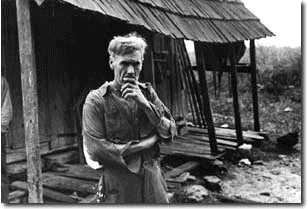 ss
walked around with their pockets turned inside out as “Hoover signs”. ss
walked around with their pockets turned inside out as “Hoover signs”.
The Depression hit the farmers the hard. Some of them had gone into debt to buy all of the new machinery of the time. They could not make the payments. Businesses were not buying their crops, so the price dropped very low. Then to make matter worse, a drought began in 1931 and lasted through 1932. The land turned into a “dust bowl.” Many farmers did stay on their land when they could afford to, at least they could try grow enough food for their families. America was not the only country that was a having trouble with their economy. Germany, Britain, and France all had the same troubles that were happening here. Some countries still owed America money from the first World War. Now, they were not able to pay it back. World Book Milliennium 2000; World Book Inc. 233
North Michigan, Chicago, IL 60601
The Album of the Great Depression Photo Herbert Hoover. men without jobs courtesy of: http://us.history.wisc.edu/hist102/lectures/lecture18.html Photos of family,campingdepression, poor farmer
courtesy of:
|